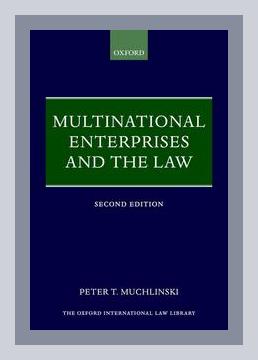Business Law and EthicsInternational Trade Law
Introduction
Peter T. Muchlinski’s “Multinational Enterprises and the Law” provides an in-depth examination of the legal landscape for multinational enterprises (MNEs). The book explores various legal frameworks that regulate the activities of MNEs and offers comprehensive guidance on navigating complex international legal environments. This summary is structured around key themes in the book, supported by concrete examples and actionable insights.
1. Legal Foundations of Multinational Enterprises
Key Point: Historical and Structural Overview
– Muchlinski begins by detailing the historical development and structural complexities of MNEs, shedding light on their formation, growth, and global operations.
– Example: He discusses the emergence of MNEs in the post-World War II era and their transformation with globalization.
Actionable Insight: Business Structuring
– Action: When forming an MNE, consider historical models of corporate structures to decide between centralized and decentralized operational frameworks.
2. Regulatory Framework and Jurisdiction
Key Point: National and International Regulations
– The book covers both national regulations (like corporate governance and tax laws) and international frameworks (such as trade agreements and treaties).
– Example: The analysis of the OECD Guidelines for Multinational Enterprises, which provide recommendations for responsible business conduct.
Actionable Insight: Compliance Strategies
– Action: Develop a compliance program that aligns with both host and home country regulations, incorporating international guidelines for ethical conduct.
3. Corporate Governance and Accountability
Key Point: Mechanisms of Accountability
– Muchlinski explains different mechanisms through which MNEs are held accountable, including internal governance policies, external audits, and regulatory oversight.
– Example: Case studies on corporations like Enron and WorldCom highlight the consequences of poor corporate governance.
Actionable Insight: Enhance Internal Policies
– Action: Establish robust internal governance policies, regular audits, and transparent reporting systems to ensure accountability and prevent malpractices.
4. Foreign Direct Investment (FDI) and Host Country Laws
Key Point: Dynamics of FDI
– The complexities of FDI laws, including bilateral investment treaties (BITs) and their role in protecting investments, are explored.
– Example: An analysis of the dispute settlement mechanisms under the ICSID Convention.
Actionable Insight: Mitigate Investment Risks
– Action: When engaging in FDI, carefully review and negotiate BITs to ensure favorable dispute settlement provisions and protections against expropriation.
5. Competition Law and Policy
Key Point: Regulation of Market Power
– The book reviews the antitrust laws of key jurisdictions like the US and the EU, which aim to prevent anti-competitive practices by MNEs.
– Example: The landmark Microsoft antitrust case in the EU is discussed, demonstrating the application of competition law to restrict abuse of market dominance.
Actionable Insight: Fair Competition Practices
– Action: Conduct regular internal audits to ensure compliance with competition laws in all operating jurisdictions, avoiding practices that could be construed as monopolistic or anti-competitive.
6. Labor Standards and Human Rights
Key Point: Ethical Employment Practices
– Muchlinski discusses legal standards and global initiatives aimed at protecting worker rights and promoting ethical labor practices.
– Example: The role of the International Labour Organization (ILO) conventions in setting international labor standards.
Actionable Insight: Labor Rights Compliance
– Action: Implement labor policies that adhere to ILO conventions, ensuring fair wages, safe working conditions, and the prohibition of child labor.
7. Environmental Regulations
Key Point: Environmental Responsibility
– The book highlights the environmental responsibilities of MNEs, emphasizing compliance with both local and international environmental laws.
– Example: The analysis of the Bhopal disaster and its implications for corporate environmental responsibility.
Actionable Insight: Sustainable Practices
– Action: Adopt and integrate sustainable environmental practices into corporate strategy, including waste reduction, energy efficiency, and compliance with environmental regulations.
8. Intellectual Property Rights (IPR)
Key Point: Protection and Exploitation of Intellectual Property
– Muchlinski covers the importance of protecting intellectual property and navigating different IP regimes across countries.
– Example: The discussion of the TRIPS Agreement under the WTO, which sets down minimum standards for many forms of intellectual property regulation.
Actionable Insight: Strategic IP Management
– Action: Formulate a robust IP protection strategy that includes registering patents, copyrights, and trademarks in key markets to safeguard innovations.
9. Dispute Resolution
Key Point: Mechanisms for Resolving Disputes
– The book explores various dispute resolution mechanisms available to MNEs, including arbitration, mediation, and litigation.
– Example: The effectiveness of international arbitration through institutions like the International Chamber of Commerce (ICC).
Actionable Insight: Efficient Dispute Handling
– Action: Opt for arbitration clauses in international contracts to ensure a neutral and efficient dispute resolution process in case of conflicts.
10. Corporate Social Responsibility (CSR)
Key Point: Integrating CSR into Business Strategy
– Muchlinski emphasizes the growing importance of CSR in the operations of MNEs and its impact on reputation and compliance.
– Example: The analysis of The Body Shop’s commitment to social and environmental issues as part of its brand identity.
Actionable Insight: CSR Initiatives
– Action: Develop and implement CSR initiatives that align with core business values, focusing on social, environmental, and economic impacts.
Conclusion
Peter T. Muchlinski’s “Multinational Enterprises and the Law” offers a rich and nuanced understanding of the legal challenges and responsibilities of MNEs. By providing historical context, regulatory insights, and practical examples, the book serves as a useful guide for businesses aiming to navigate the complexities of international trade law effectively. Adopting the actionable insights drawn from each major point can help businesses operate more efficiently and ethically within the global marketplace.
